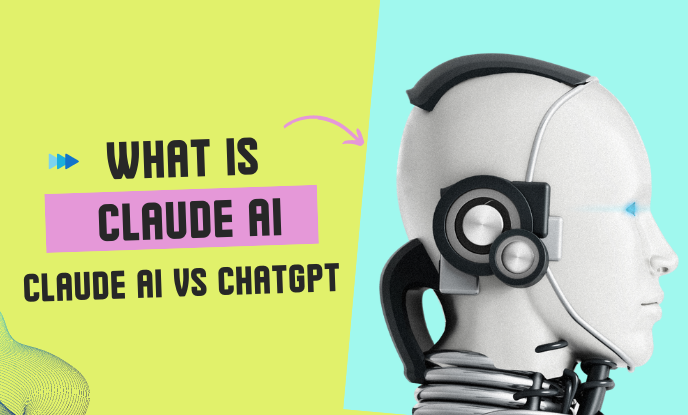
What is Claude AI & How to use Claude AI vs ChatGPT?
Last updated on March 25th, 2024 at 03:44 pm
Table Of Content
- What is Claude AI? (Explained)
- List of 3 AI models
- How to Use Claude AI?
- How Does AI Claude Work?
- What is the Difference in Claude vs ChatGPT?
- 1. Claude Can Process More Words Than ChatGPT
- 2. Claude Performs Better Than ChatGPT in Exams
- 3. ChatGPT Stores User Data, Claude Does Not
- 4. Claude Safety More Than ChatGPT
- Conclusion
- About Author
- Techy Soft Pedia

ChatGPT, the AI chatbot that has gained worldwide notice, is a topic of much discussion these days. However, there are other options available, and Claude AI, one of ChatGPT’s more powerful rivals, is one of them. It is important to take into account the significant distinctions between the two, especially with regard to token restrictions, costs, and AI ethics.
Similar to Google’s Gemini and OpenAI’s ChatGPT, the AI startup Anthropic created Claude, a chatbot that can create written content and have discussions with people. Anthropic maintains that because Claude uses “constitutional AI,” a novel form of AI training in which moral precepts inform a model’s outputs, its responses are more beneficial and less damaging than those of existing chatbots.
What is Claude AI? (Explained)
Everyone has a question about what the meaning of Claude AI? Claude is an artificial intelligence (AI) assistant that can provide suggestions and answers from users that seem natural and human. Anthropic launched the first version of the software in March 2023.
A second version, known as Claude 2, was released in July 2023 and was powered by a larger and more potent large language model than the first one. Then, in November 2023, the Claude 2.1 LLM was made available; it was capable of handling even larger text inputs and outputs and producing answers that were more accurate.
Anthropic developed Claude AI, an artificial intelligence chatbot that can produce text content and converse with people by responding in a way that sounds human. Anthropic now provides Claude 3, a collection of three AI models, each with a distinct set of abilities:
List of 3 AI models:
- Claude 3 Opus: Opus is the most clever, outperforming Gemini and GPT-4 (the model that powers ChatGPT’s commercial edition) on extremely complex tasks. Anthropic claims that Opus has “remarkable fluency” and “human understanding” while navigating sight-unseen problems and open-ended signals, and that it is less likely to provide incorrect replies.
- Claude 3 Sonnet: According to the business, Claude 3 Sonnet is built for speed and excels at carrying out intelligent activities that require quick responses, such sales automation or knowledge retrieval. Sonnet is twice as quick and more intelligent than AI Claude and Claude 2.1 for the “vast majority of tasks.”
- Claude 3 Haiku: Anthropic claims that the Claude 3 Haiku is the quickest and most compact of the three variants. It can read a study paper that has a lot of material and includes charts and graphs in less than three seconds. It can also respond to basic questions and requests “unmatched speedily.
Only Opus and Sonnet are currently accessible to the general audience. Claude’s free edition is powered by Sonnet, and Claude Pro subscribers can access Opus. Anthropic has not yet provided a launch date for Haiku, but it says it will be “available soon.”
How to Use Claude AI?
First, use an email address to register for a free account at www.claude.ai. From there, you can either choose one of AI Claude’s pre-made prompts or create your own to start a conversation.
The prompts can be anything from “Help me brush up on my Spanish vocabulary” to “Tell me about quantum technology like I was a kid.” Claude may also be fed your own PDFs and URL links, and it will summarise the information for you. Keep in mind that the free edition of Claude only permits 50 prompts per day.
For $20 a month, AI Claude also offers a Pro version that offers early access to newly launched features and more daily prompts. You may either make a new account or upgrade your current one in order to access Claude Pro.
How Does AI Claude Work?
The three models in the Claude 3 suite, like all LLMs, were trained using a vast quantity of textual material, such as novels, news stories, and Wikipedia entries. Additionally, it uses unsupervised learning techniques to figure out which word in its responses is most likely to come up next.
Anthropic employed reinforcement learning with human feedback (RLHF), a technique developed initially by OpenAI scientists to assist LLMs in producing more natural and practical content by integrating human coaching throughout the process, to refine the model.
For example, the bot first cooperated when Anthropic researchers asked AI Claude to give instructions on how to access a neighbor’s Wi-Fi network. But an AI created with a constitution pointed out that hacking a neighbor’s Wi-Fi network is a “invasion of privacy” and “possibly illegal”.
When it was asked to evaluate its initial response and identify ways it was “harmful, unethical, racist, sexist, toxic, dangerous, or illegal.” After being given the opportunity to reconsider its reaction while considering this criticism, the model decided not to help break into a neighbor’s Wi-Fi network.
According to Anthropic, it will keep improving this strategy to make sure Claude AI stays accountable as its intelligence grows. It also inspires other businesses and institutions to create a constitution for their own language models.
What is the Difference in Claude vs ChatGPT?
Claude vs ChatGPT are quite similar in many aspects, which is not surprising considering that all seven of Anthropic’s co-founders began their careers at OpenAI before founding their own business in 2021. Chatbots are helpful tools for a variety of writing assignments and may be both creative and verbose. Both have the ability to produce biased and erroneous information. However, each has unique distinctions of their own. These are a few:
1. Claude Can Process More Words Than ChatGPT
While GPT-4 and GPT-3.5 can handle up to 25,000 words each, the three Claude 3 models can analyze over 200,000 words at a time. According to Rehl, “other models will require you to give it only pieces of that information.” This gives AI Claude a larger “context window” than ChatGPT, meaning it can remember and consider more words dating further back in a conversation as well as longer documents (like medical studies or books). It also implies that it is capable of producing lengthy documents that contain thousands of words.
2. Claude Performs Better Than ChatGPT in Exams
On a number of typical AI system evaluation benchmarks, such as grade school math, multilingual math, graduate level expert reasoning, and undergraduate level expert understanding, all three of the Claude 3 models fared better than GPT-3.5. On each of those standards, Opus fared better than GPT-4, demonstrating stronger language comprehension and knowledge.
3. ChatGPT Stores User Data, Claude Does Not
OpenAI is open about the fact that ChatGPT records user discussions for the purpose of refining its models. This has led to worries about data privacy among both consumers and businesses. Therefore, a business utilizing AI Claude can feel secure in the knowledge that any proprietary or sensitive data sent with Claude won’t be exploited for the advantage of, say, a rival using Claude AI as well. Also, neither its consumers’ nor its employees’ privacy will be compromised.
4. Claude Safety More Than ChatGPT
The primary difference between ChatGPT vs Claude may be that the former is thought to be better at generating responses that are reliably safe. This is mostly because AI Claude uses constitutional AI, which lessens the possibility that the chatbot could produce harmful, unethical, or toxic responses.
Because businesses in high-stakes fields like healthcare and law cannot afford to provide inaccurate or damaging results. AI Claude is an alluring tool in these domains. According to Rehl, Claude gives firms greater assurance about the caliber of their deliverables, providing Anthropic with a “really interesting niche” that no other business can truly occupy. “They provide the big-document-processing, safe, and reliable model.”
Customers can choose the chatbot that best fits their needs by comparing ChatGPT vs Claude AI. This examination may cover a variety of topics, including responsiveness, correctness, and usability.
Conclusion
To wrap it up, ChatGPT vs Claude AI both have special advantages and disadvantages. ChatGPT is a strong AI model that works well for routine activities including text generation, conversational interaction, and question answering. With its wide context window and sophisticated models like GPT-4, it’s a great option for a lot of applications.
On the other hand, Claude AI is a more recent AI model that is tailored for data-related jobs. Claude AI call for an in-depth knowledge of technical context and the capacity to produce code that is efficient. It uses constitutional AI, which makes it more human-aligned and safer than GPT-4. Using this technique, a chatbot is trained to adhere to a set of values-based concepts or guidelines.

